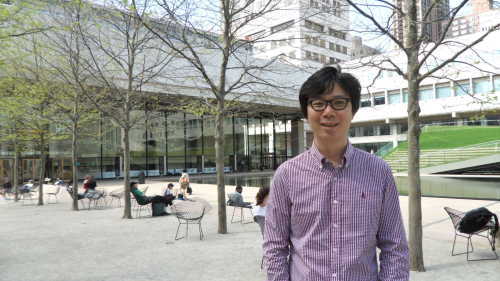 |
Korean author Kim Young-ha in New York (Kim Yoon-mi/The Korea Herald) |
NEW YORK ― It has been quite a while since Korean novelist Kim Young-ha was last heard from.
Apparently burned by the heated online debates over systemic problems in Korea’s literary scene and the tragic death of aspiring screenwriter Choi Go-eun, Kim had declared in February that he would quit tweeting and blogging.
However, Kim, during an interview at a small rest area near Lincoln Center Theater in New York, seemed cheerful, easygoing and more open to the outside world. He is currently staying in New York as a visiting scholar of East Asian Studies at Columbia University.
The 42-year-old has been frequently compared with Korean novelist Shin Kyung-sook, whose book “Please Look After Mom” was brought out in the U.S. market on April 5 by the big name publishing house Alfred A. Knopf. Shin’s book ranked in the top 40 on the list of Amazon.com’s 100 bestselling books, and Kim’s book “Your Republic is Calling You” made it to the world’s “Top 100 Mysteries” on Amazon.
“Honestly, Korean writers, including Shin and I, still have a long way to go. I haven’t noticed any big buzz around Korean literature in New York yet,” Kim told The Korea Herald.
“Of course it was rare that Korean books ranked that high, but the U.S. book market is too big and diverse to say we have made a meaningful impact,” he said.
Kim said, in the global publication market, writers are ranked in many different tiers; there are “A-list authors” whose works are found in airports all around the world; those not found in airports but still acclaimed; and those whose works were translated into other languages but couldn’t reach the hearts of overseas readers.
“Here, even if a million copies of a Korean book are sold, it won’t make much impact. Plus, it is another story whether a well-sold book receives a good literary evaluation,” he said.
Kim’s two novels that are available in English ― “Your Republic is Calling You” (2006) and “I Have the Right to Destroy Myself” (1996) ― were translated by Kim Chi-young, the star translator who worked on Shin’s “Please Look After Mom.” “Your Republic is Calling You” won the prestigious Manhae Literary Award in 2007.
His next English book will be “Black Flower,” (2003) which won the Dong-in Literary Award in 2004.
The English translation will be out in the U.S. some time next year by publishing house Houghton Mifflin Harcourt, Kim said. The book was translated by Charles La Shure, a professor at the Graduate School of Interpretation and Translation of Hankuk University of Foreign Studies. La Shure fell so much in love with the novel that he volunteered to translate it personally, Kim said. Kim showed the translated version to his agent and they decided to make it the next English book. It tells a story of Korean diaspora forced into slave labor in a Mexican plantation.
“The novel covers Korean history but also touches upon a universal theme of diaspora,” Kim said.
Among Koreans, the author is also known as a tech-savvy writer, whose personal iTunes podcast “Time to read a book” encouraged many listeners to revisit the value of Korean literature by reading excerpts of literary works by famous writers and commenting on them.
After recording 28 episodes, the last one is of a reading of late writer Park Wan-suh’s book “Ode for Longing” on Jan. 23, Kim indefinitely suspended podcasting.
However, he said he will resume it soon.
“I caught a cold recently but I’m thinking about resuming the podcasting soon. Even though New York is a busy city, I feel more relaxed here than in Korea,” he said.
“Podcasting is one of the good things I learned in New York. It’s a pity that Koreans do not really engage in personal podcasting when they have such strong IT infrastructure,” said Kim, adding that he found it really weird to see Korean university students squandering their powerful gadgets such as Apple MacBook laptops to only surf the Web in Hongdae cafs.
While Americans tend to create their own content when blogging, Korean people are more focused on commenting on social issues, Kim said.
“But I guess it is a richer society where people continually create their own content,” he said.
But he made it clear that he does not want to take part in Twitter again.
“Since I quit tweeting, I could think about issues as long as I wanted. To speak about certain things is like opening the lid of a pressure cooker even before the rice is fully cooked,” Kim said.
“When I see a movie or read a book, I can create chemical changes of the content within me by rolling them inside me. If I speak about them too quickly, they are consumed too quickly. So, I’m not coming back to Twitter.”
Kim is currently working on a new novel, which will be his sixth work of fiction.
Although he kept it a secret as to what kind of story it will be, he said he is reading classical literature including “Samguk Yusa,” or Memorabilia of the Three Kingdoms ― a collection of legends, folktales, and historical accounts relating to the Goguryeo, Baekje and Silla kingdoms.
“I don’t think I’ll be able to write a masterpiece, but I just want to do good to myself, just as people like to give good and beautiful things to their children,” he said.
“I try to do valuable things, meet good people a lot and share hearts. Then, I’ll find myself aged.”
By Kim Yoon-mi, Korea Herald correspondent
(yoonmi@heraldcorp.com)







